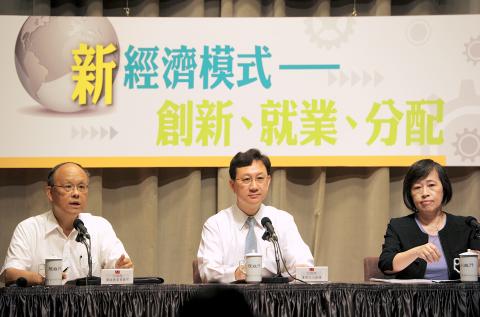The Executive Yuan yesterday outlined an implementation plan for the government’s “new southbound policy,” which is aimed at boosting ties with 16 ASEAN and South Asian nations, as well as Australia and New Zealand.
The plan is based on four principles — economic cooperation, special talent exchange programs, resource sharing and regional integration — and will pave the way for a regional economic community, Minister Without Portfolio John Deng (鄧振中) said.
Businesses that are among the nation’s flagship industries, such as oil refining, power generation, environmental protection, electronic toll collection and the Internet of Things, will be the first to be marketed to partner nations, Deng said.

Photo: CNA
A trade office “Taiwan Desk” is to be established in other nations to streamline communication between local governments and Taiwanese businesses, he said.
The Executive Yuan will also establish a trade negotiation office — led by Deng — to direct negotiations with 18 partner nations, and the office is to operate independently of the Presidential Office’s New Southbound Policy Office.
“A ‘national team’ will be established to help Taiwanese businesses reach out to foreign markets and find their niche,” Development Council Deputy Minister Kao Shien-quey (高仙桂) said.
“The new southbound policy differs from previous ones in that the government seeks to establish bilateral economic partnerships with Southeast Asian nations instead of unilaterally seeking subcontracts and investment opportunities in those nations,” Kao said.
Kao said that the Council of Agriculture will establish a company to market Taiwanese products and provide technical assistance to other nations, while the Ministry of Science and Technology will launch technology exchange programs focusing on disaster prevention.
Skilled immigrant workers will be eligible to apply for long-term residency and professional certification programs, while the language skills of new immigrants and their children will be used to attract more Southeast Asian tourists and teach Southeast Asian languages to Taiwanese, she said.
The number of occupational training programs is to be increased to raise the number of international students from 28,000 to 56,000 by 2019.
Scholarships are to be provided to Taiwanese students to pursue education opportunities in partner nations, where Taiwanese colleges are to establish campuses.
The government is to invest NT$4.2 billion (US$133.31 million) to implement the policy, she said.
In response to a question on how Taiwan can compete with rivals like China, when Beijing has invested a lot of time and resources into partnering with Southeast Asian nations, Deng said Taiwan’s edge lies in its “soft power” such as people’s sincerity, hospitality and work ethic.
“There is no need to compete with China’s ‘One Belt, One Road’ initiative. Taiwanese businesses will also seek investment opportunities created by the Chinese initiative,” Deng said.

‘TAIWAN-FRIENDLY’: The last time the Web site fact sheet removed the lines on the US not supporting Taiwanese independence was during the Biden administration in 2022 The US Department of State has removed a statement on its Web site that it does not support Taiwanese independence, among changes that the Taiwanese government praised yesterday as supporting Taiwan. The Taiwan-US relations fact sheet, produced by the department’s Bureau of East Asian and Pacific Affairs, previously stated that the US opposes “any unilateral changes to the status quo from either side; we do not support Taiwan independence; and we expect cross-strait differences to be resolved by peaceful means.” In the updated version published on Thursday, the line stating that the US does not support Taiwanese independence had been removed. The updated

‘CORRECT IDENTIFICATION’: Beginning in May, Taiwanese married to Japanese can register their home country as Taiwan in their spouse’s family record, ‘Nikkei Asia’ said The government yesterday thanked Japan for revising rules that would allow Taiwanese nationals married to Japanese citizens to list their home country as “Taiwan” in the official family record database. At present, Taiwanese have to select “China.” Minister of Foreign Affairs Lin Chia-lung (林佳龍) said the new rule, set to be implemented in May, would now “correctly” identify Taiwanese in Japan and help protect their rights, the Ministry of Foreign Affairs said in a statement. The statement was released after Nikkei Asia reported the new policy earlier yesterday. The name and nationality of a non-Japanese person marrying a Japanese national is added to the

AT RISK: The council reiterated that people should seriously consider the necessity of visiting China, after Beijing passed 22 guidelines to punish ‘die-hard’ separatists The Mainland Affairs Council (MAC) has since Jan. 1 last year received 65 petitions regarding Taiwanese who were interrogated or detained in China, MAC Minister Chiu Chui-cheng (邱垂正) said yesterday. Fifty-two either went missing or had their personal freedoms restricted, with some put in criminal detention, while 13 were interrogated and temporarily detained, he said in a radio interview. On June 21 last year, China announced 22 guidelines to punish “die-hard Taiwanese independence separatists,” allowing Chinese courts to try people in absentia. The guidelines are uncivilized and inhumane, allowing Beijing to seize assets and issue the death penalty, with no regard for potential

‘UNITED FRONT’ FRONTS: Barring contact with Huaqiao and Jinan universities is needed to stop China targeting Taiwanese students, the education minister said Taiwan has blacklisted two Chinese universities from conducting academic exchange programs in the nation after reports that the institutes are arms of Beijing’s United Front Work Department, Minister of Education Cheng Ying-yao (鄭英耀) said in an exclusive interview with the Chinese-language Liberty Times (the Taipei Times’ sister paper) published yesterday. China’s Huaqiao University in Xiamen and Quanzhou, as well as Jinan University in Guangzhou, which have 600 and 1,500 Taiwanese on their rolls respectively, are under direct control of the Chinese government’s political warfare branch, Cheng said, citing reports by national security officials. A comprehensive ban on Taiwanese institutions collaborating or